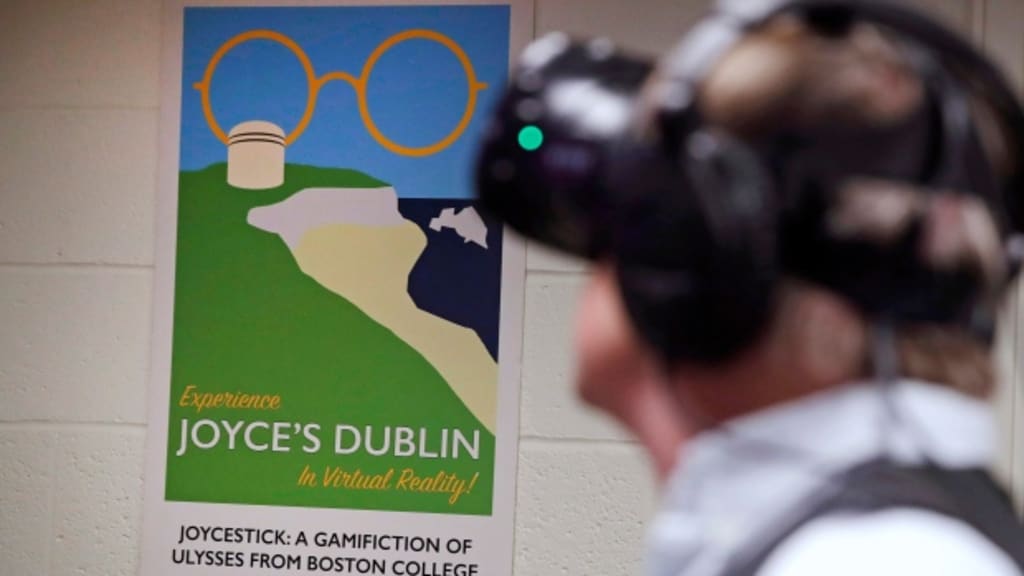Classic Literature Takes A Tech Turn
Boston College Students Go To Ireland As Part Of "Joycestick"

Do readers need a high tech exposure to classical literature in order to properly enjoy it?
While the answer to that question may not be known, it's something that Boston College students are curious about. There is a group of students from the esteemed college who are designing a virtual reality (VR) experience called "Joycestick." The game takes players through the Dublin that readers fell in love with in James Joyce's Ulysses, some of which has been simply lost through the passage of time.
The English professor involved in the project, Joseph Nugent, said that this is one of the first times that using VR to enhance classical literature has been done.
"This is a new way to experience the power of a novel," he said. "We're really at the edge of VR. There's no guidance for this. What we have produced has been purely out of our imagination."
Enda Duffy, English Department chair at the University of California, Santa Barbara, has tried a prototype of the game and was impressed.
"The VR version in this way completes the book," she said. "It makes it real. 'Ulysses' is an ideal book to be turned into a VR experience, since Dublin is, you might say, the book's major character."
This is not the first time that readers have had the opportunity to explore the world of classic literature through the use of gaming. In 2011, a video game based on F. Scott Fitzgerald's The Great Gatsby went viral because people really enjoyed the classic feel of a 1980s-era video game.
Joyce's Ulysses is basically considered the epitome of modernist literature. The novel traces Leopold Bloom, a typical Dubliner, throughout a regular day. The title reflects how the novel draws parallels between Bloom's day and The Odyssey by Homer.
D. Fox Harrell, a digital media professor at the Massachusetts Institute of Technology (MIT), noted that the Boston College students' choice to work on a text like Ulysses was unique, and while the virtual reality project does not take those who experience it on a step-by-step through the novel, it does give those involved in game play a clearer picture of what Dublin might have been like during the time frame in which the novel is set.
"It requires multiple entry points and modes of interpretation, so it will be fascinating to see how their VR system addresses these aspects of the work," said Harrell, acknowledging that he has not yet played the game.
The Boston College team acknowledges that there are inherent challenges as a result of trying to take on what is likely one of the most classic pieces of literature and transforming it to a VR game. The Joycestick group has dubbed their project "gamefiction" and it hopes that the project inspires the sorts of discussions that should take place at the heart of liberal arts education.
Joycestick recreates noted scenes from Ulysses, such as the Martello Tower in Sandycove where Stephen Dedalus lives. It also directs the user to touch certain objects, like a bright red cricket ball, a bar of lemon soap, or a telegram bearing sad news. When you touch an object, a recorded narration from the book is set off, and the passage's significance to the novel is explained.
As might be expected, some of the work had to be filmed and photographed in Ireland. Nugent said that the detail-oriented work was all for the purpose of ensuring that the reader's - or gamer's - experience allowed them to become emotionally invested in the VR Ulysses world.
“We look on VR as the ultimate empathy machine, in that we don’t simply want to excite the readers – the viewers – but to move them, to engage them with the emotions and events in the book,” Nugent said.
The game is set to be released June 16, 2017 - the date which is followed throughout the narrative in Ulysses.
About the Creator
Christina St-Jean
I'm a high school English and French teacher who trains in the martial arts and works towards continuous self-improvement.






Comments
There are no comments for this story
Be the first to respond and start the conversation.